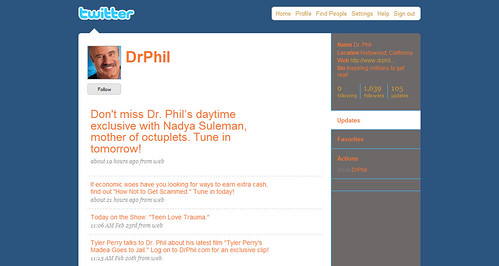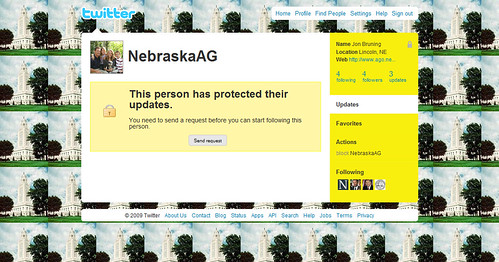I’ve been looking at a lot of different Twitter accounts lately while putting together some upcoming presentations and I’ve noticed a few things. Increasingly, I’m noticing Twitter accounts of those unclear on the concept of conversation; the thing that actually makes Twitter useful to people.
Exhibit A: Dr. Phil 
As of this screenshot he’s got 1,639 followers. This is to be expected. So what’s the problem? He’s following exactly zero people back! Now, I don’t care whether this actually is Dr. Phil himself or someone on his staff but as I read this he’s willing to tell you things but he’s not willing to listen. Total FAIL!
Exhibit B: The Nebraska Attorney General 
I’ve got no problem with people having private Twitter accounts. Mine’s public, but my FriendFeed account is private. However, if you’re going to have a private account don’t use your government title as your username. The moment you do that, you can’t have a private account, you need to continue to act as a public employee and be open. You want a private account, use your own name or a made-up name, not something that represents your office. (Note: I did send a follow request on Sunday and waited 72 hours with no response before listing this as a fail. Should he honor my request I will attempt to discuss this with him.)
UPDATE 8 April2009:
I’m not saying that I can claim any responsibility for this but the NebraskaAG account no longer exists.

Micheal, your comments might be a little hasty. I am managing my library’s twitter, and we don;t follow anyone back — becasue of how we are implementing twitter. It’s currently embedded on our homepage. This is both a good and a bad, but the way we are using it now means that @ responses would be very oddlooking on what we are considering the primary function of *our* twitter feed.I do eventually want to make it more interactive, but the real bonus for us is that we can use the tool and keep it vital and we can do so wihtout having to try to persuade people to follow us. Extra bonus? People are followiing us. For now, this is working for us.
Twitter is a tool. And we have found a way to use it that works for us. We’ll do the same for Facebook and MySpace and LibraryThing. That’s the beauty of these tools –everyone who uses them gets to decide what works best for them. Maybe we aren’t using it to it’s full potential. maybe. But We’re using it sucessfully, in ways that increase our potential. And that’s what really matters, isn’t it?
It’s funny you posted this, I was just made aware of this video by Perry Belcher. I thought this was a great video…
Twitter snobs…It cracked me up too. Here’s the link,
I would encourage libraries to join in the conversation. One of the nicest twitter accounts I follow is the Grand Rapids Public Library account. They actually have two twitter accounts that I know about, a general one, GRPL, and another called GRPLTeens.
They have made a choice to use twitter for two-way conversation and it seems to be working very well for them. I follow and am followed by GRPL. The fact that we are twitter “pals” makes me feel much more connected to that library than my own local library.
Reading their responses makes me feel like they are invested in service to their patrons on a very personal level. It’s a great feeling for me to know the library is so deeply engaged with me and their community of users. It sure didn’t take much to elicit that feeling from me and I bet other GRPL twitter buds. Warm fuzzies go a long way!
My own local library doesn’t follow anyone else on twitter, so it’s basically a notice board they provide with the account. Consequently, I don’t pay much attention to it and it’s treated like any other news service such as the BBC’s twitter feed. I can tell you that I’m not feeling any personal connection or investment with the BBCNews either.
There sure are a lot of benefits to the conversation and twitter provides one darn cheap way to make the most of it.
Not twitter, but this seems up your alley. http://kylesmithonline.com/?p=2820 Joe Biden Thinks Web Sites Have Numbers